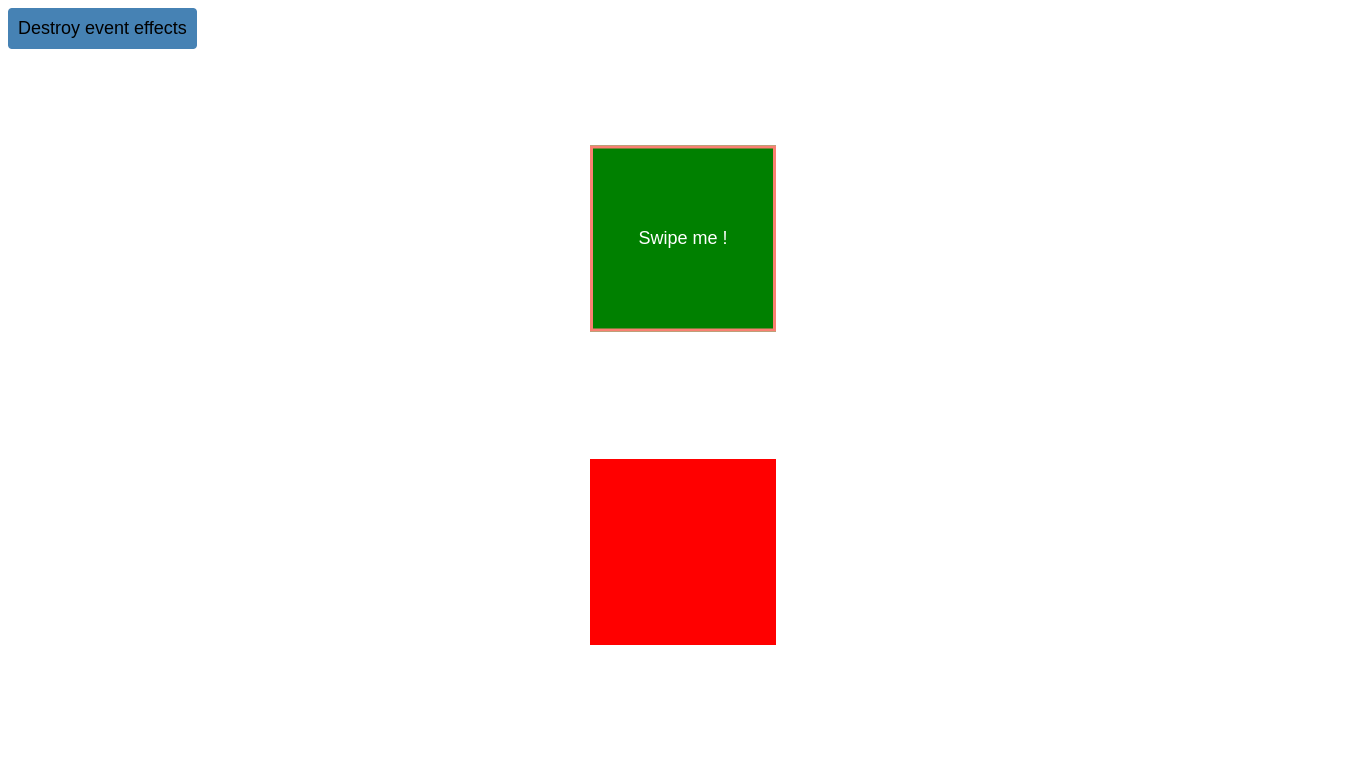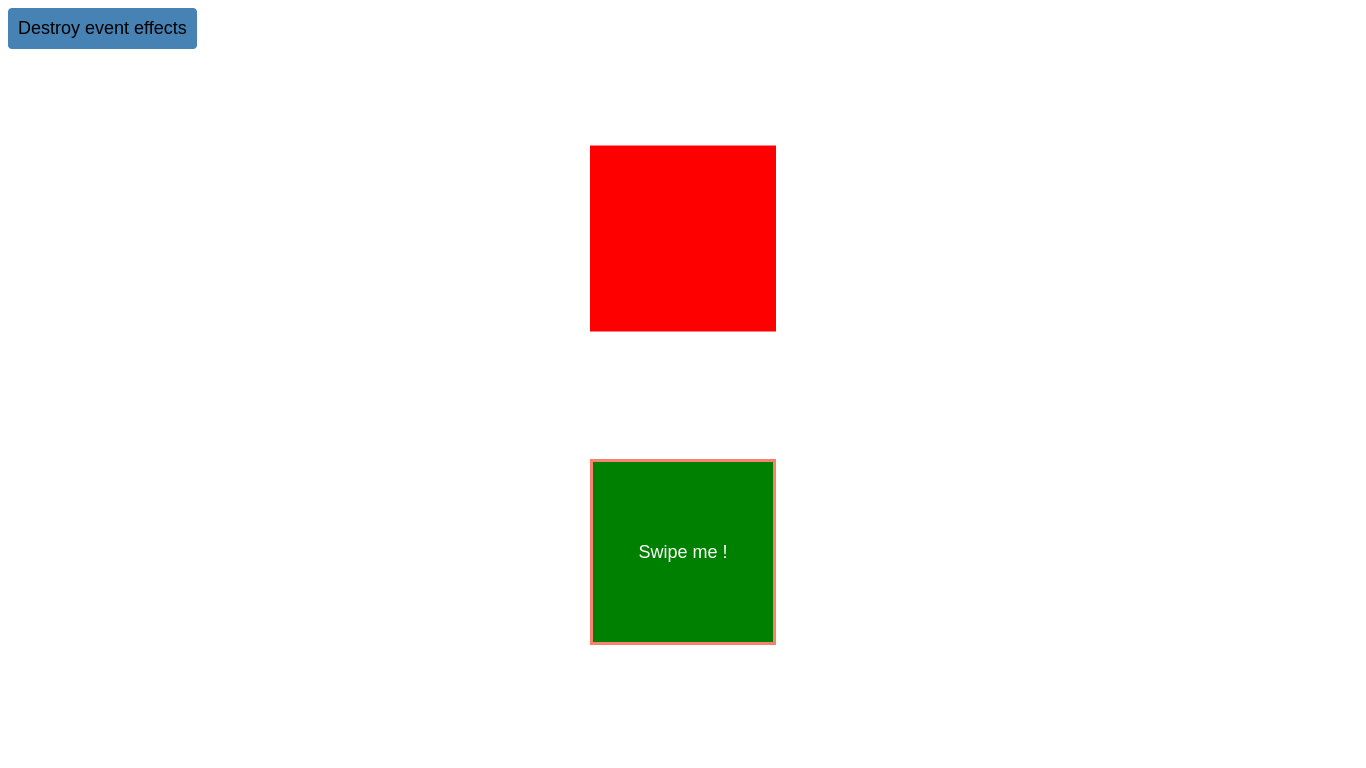Swipe Events Manager
This Node Package Manager (NPM) is a front-end library for managing touch screen events on mobile devices. It provides a support for Javascript and Typescript.
Table of contents
Access links
An example of use case of the package is already hosted on web and
can be accessible through one of these links below :
- https://CodiTheck.github.io/swipe_events_manager
- https://obrymec.github.io/swipe_events_manager
- https://obrymec.gitlab.io/swipe_events_manager
References
The package sources can be found via one these links below:
- https://www.npmjs.com/package/@prince-obrymec/swipe-events-manager
- https://github.com/obrymec/swipe_events_manager
- https://gitlab.com/obrymec/swipe_events_manager
Final result
This is the final result of the project :


Installation
We can install the module via npm, pnpm or yarn. For npm,
use the command line below :
npm install @prince-obrymec/swipe-events-manager --save-devFor pnpm, use the command line below :
pnpm install @prince-obrymec/swipe-events-manager --save-devFor yarn, use the command line below :
yarn add @prince-obrymec/swipe-events-manager --save-devWe can also get the CDN link there :
<!--CDN links for ES6 support-->
<script
src = "https://CodiTheck.github.io/swipe_events_manager/build/swipe.min.js"
type = "text/javascript"
></script>
<script
src = "https://CodiTheck.github.io/swipe_events_manager/build/swipe.js"
type = "text/javascript"
></script>
<!--CDN links for CJS support-->
<script
src = "https://CodiTheck.github.io/swipe_events_manager/build/cjs/swipe.min.js"
type = "text/javascript"
></script>
<script
src = "https://CodiTheck.github.io/swipe_events_manager/build/cjs/swipe.js"
type = "text/javascript"
></script>Get started
Before listen any swipe event, we must create an object instance of that. Of course, we must also import the module before any usage.
// Package importation.
import {SwipeEventsManager} from "@prince-obrymec/swipe-events-manager";
// We can create a swipe manager with a tag
// reference.
const swipeManager1 = new SwipeEventsManager (myTagRef);
// We can also create a swipe manager with
// a tag id, class etc...
const swipeManager2 = new SwipeEventsManager ("#my-tag");Notice that when we creating a swipe manager, we can pass two arguments to that object. The first is the tag where swipe events will be listened and the second is a callback method that is triggered when any swipe event is detected on the selected markup. The callback fetch the swipe direction for you. Only first argument is required when we creating an object instance of a swipe events manager.
Now we can rewrite the code above like this :
// Package importation.
import {SwipeEventsManager} from "@prince-obrymec/swipe-events-manager";
// We can create a swipe manager with a tag
// id, class, etc... and a callback method
// to listen upcoming swipe events on the
// selected tag.
const swipeManager = new SwipeEventsManager (
"#my-tag", function (direction) {
/** ... */
}
);We can know the swipe's direction thank the fetched direction from our callback. The direction is a constant with the following values :
- SWIPE_UP : Returned when the swipe direction is to top.
- SWIPE_RIGHT : Returned when the swipe direction is to right.
- SWIPE_DOWN : Returned when the swipe direction is to bottom.
- SWIPE_LEFT : Returned when the swipe direction is to left.
Finally the full source code will be :
// Package importation.
import {
SwipeEventsManager,
SwipeEventType
} from "@prince-obrymec/swipe-events-manager";
// We can create a swipe manager with a tag
// id, class, etc... and a callback method
// to listen upcoming swipe events on the
// selected tag.
const swipeManager = new SwipeEventsManager (
"#my-tag", function (direction) {
// The selected tag's name.
const tagName = swipeManager.getTag ().tagName;
// Whether the direction is right.
if (direction === SwipeEventType.SWIPE_RIGHT) {
// Makes a warn on the browser.
window.alert (`SWIPE RIGHT DETECTED: ${tagName}`);
}
// Whether the direction is bottom.
else if (direction === SwipeEventType.SWIPE_DOWN) {
// Makes a warn on the browser.
window.alert (`SWIPE DOWN DETECTED: ${tagName}`);
}
// Whether the direction is left.
else if (direction === SwipeEventType.SWIPE_LEFT) {
// Makes a warn on the browser.
window.alert (`SWIPE LEFT DETECTED: ${tagName}`);
}
// Whether the direction is top.
else if (direction === SwipeEventType.SWIPE_UP) {
// Makes a warn on the browser.
window.alert (`SWIPE UP DETECTED: ${tagName}`);
}
}
);Another way to do that is to use listen method provided
by the swipe events manager directly. But use this method
if and only if you don't provide a callback when you
creating a swipe events manager. The code below show
you a use case :
// Package importation.
import {
SwipeEventsManager,
SwipeEventType
} from "@prince-obrymec/swipe-events-manager";
// We can create a swipe manager with a tag
// reference.
const swipeManager = new SwipeEventsManager (
myTagRef
);
// Listens swipe directions.
swipeManager.listen (function (direction) {
// Whether the direction is right.
if (direction === SwipeEventType.SWIPE_RIGHT) {
// Makes a warn on the browser.
window.alert ("SWIPE RIGHT DETECTED !");
}
// Whether the direction is bottom.
else if (direction === SwipeEventType.SWIPE_DOWN) {
// Makes a warn on the browser.
window.alert ("SWIPE DOWN DETECTED !");
}
// Whether the direction is left.
else if (direction === SwipeEventType.SWIPE_LEFT) {
// Makes a warn on the browser.
window.alert ("SWIPE LEFT DETECTED !");
}
// Whether the direction is top.
else if (direction === SwipeEventType.SWIPE_UP) {
// Makes a warn on the browser.
window.alert ("SWIPE UP DETECTED !");
}
});The package offers also some additional that are :
// Package importation.
import {SwipeEventsManager} from "@prince-obrymec/swipe-events-manager";
// The old tag reference.
const oldTag = document.querySelector ("#old-tag");
// The new tag reference.
const newTag = document.querySelector ("#new-tag");
// Creating a new object instance of a swipe events manager.
const swipeManager = new SwipeEventsManager (oldTag);
// Returns the current selected tag reference on the manager.
console.log (swipeManager.getTag ());
// Overrides the current selected tag to another. Notice
// that old tag events are destroyed before go to the
// new tag.
swipeManager.setTag (newTag);
// We could also set the active tag by giving the id,
// class, etc... of the new tag directly.
swipeManager.setTag ("#new-tag");
// We can destroy all listened swipe events on the
// active markup.
swipeManager.free ();Sources code
If you want to get package sources code, make sure to have NodeJs already installed in your machine. If it isn't the case, you can install NodeJs through the command lines below :
cd ~;\
sudo apt install curl;\
curl https://raw.githubusercontent.com/creationix/nvm/master/install.sh | bash;\
source ~/.bashrc;\
nvm --version;\
nvm install --lts;\
node --version;\
npm install yarn --global;\
yarn --versionCloning
git clone git@github.com:CodiTheck/swipe_events_manager.git swipe_events_manager/Dependencies installation
Go to the root folder of the project sources and run :
yarn installRunning
Go to the root folder of the project and run :
yarn startThen, open your favorite browser and tap on the search bar, the following link :
http://localhost:1234/Enjoy :)





